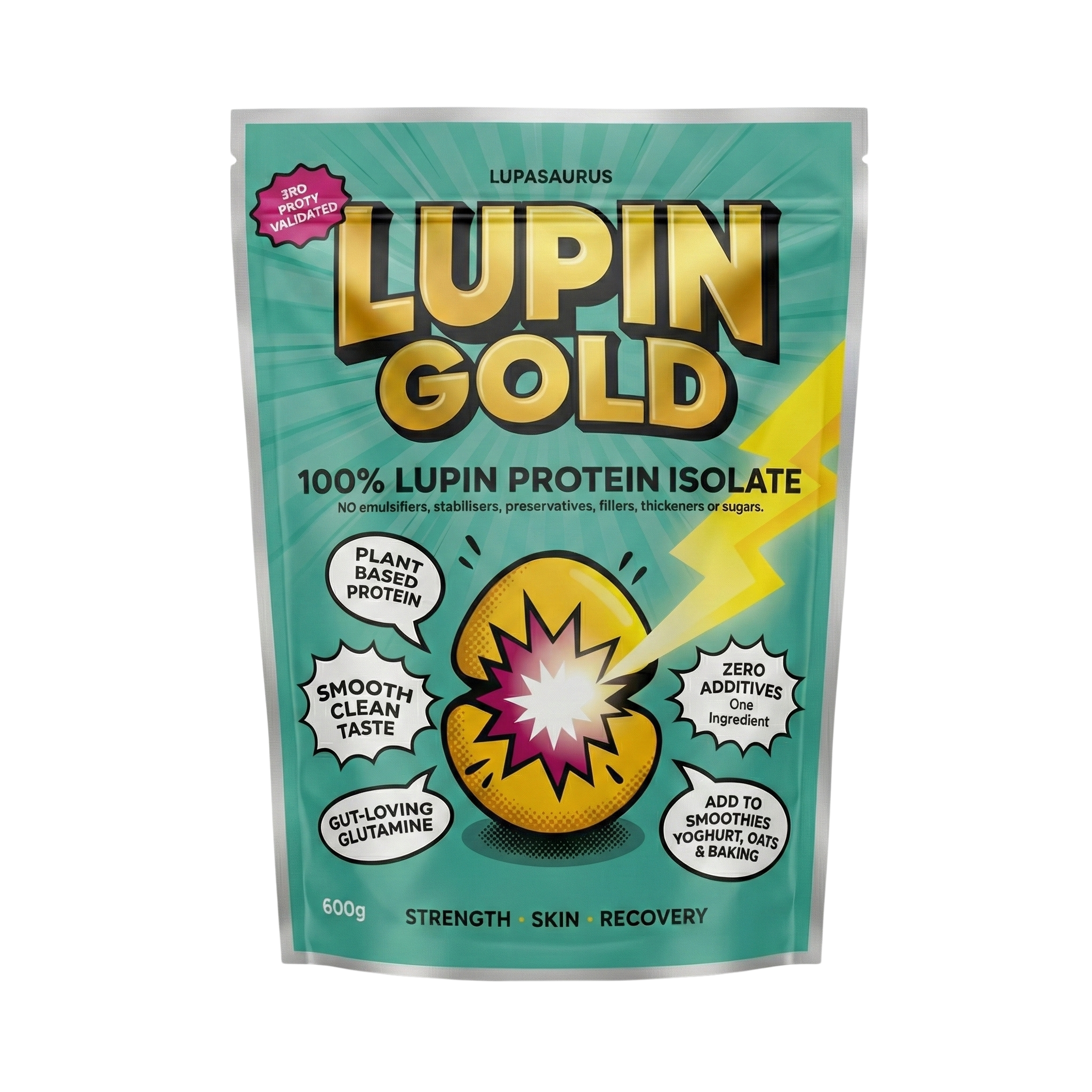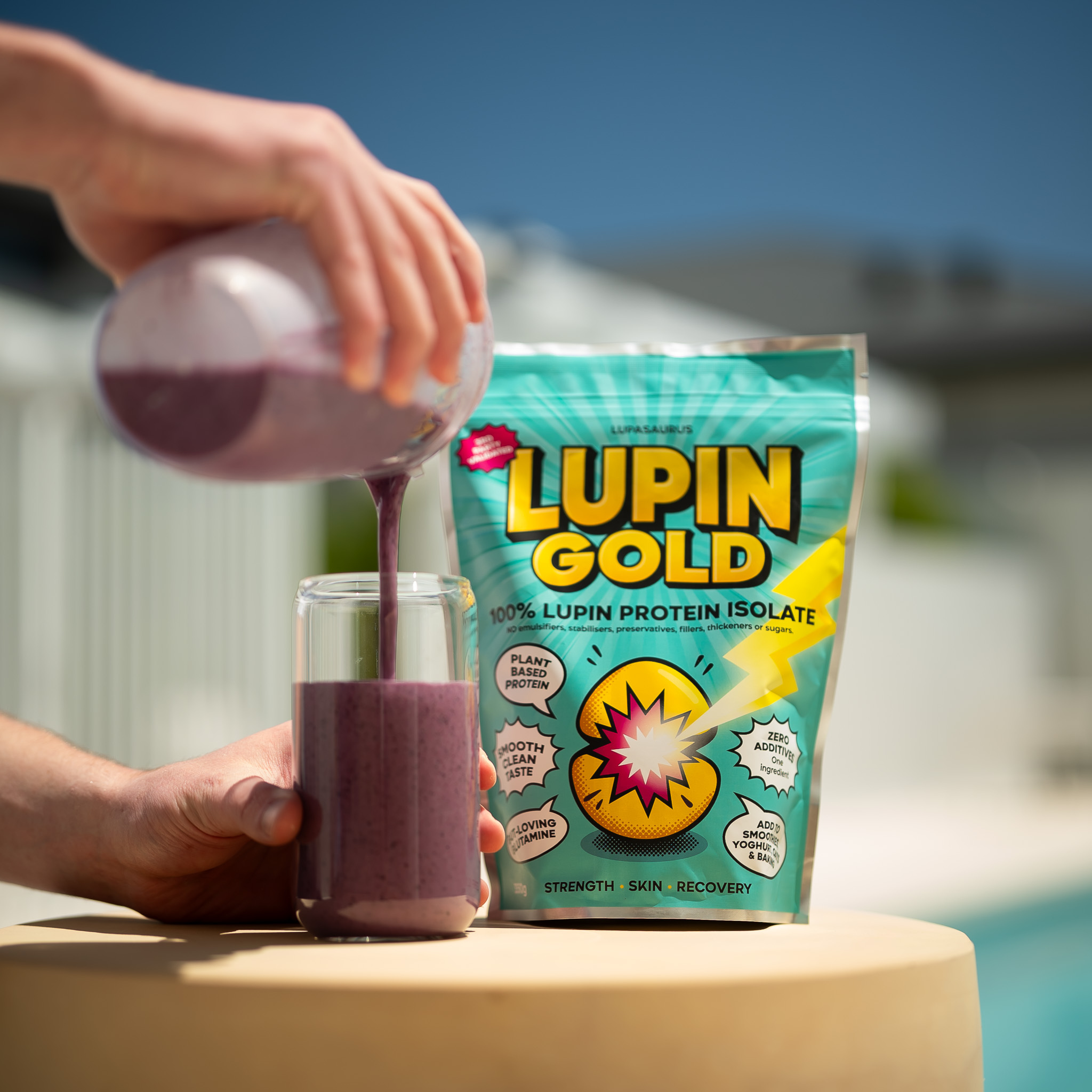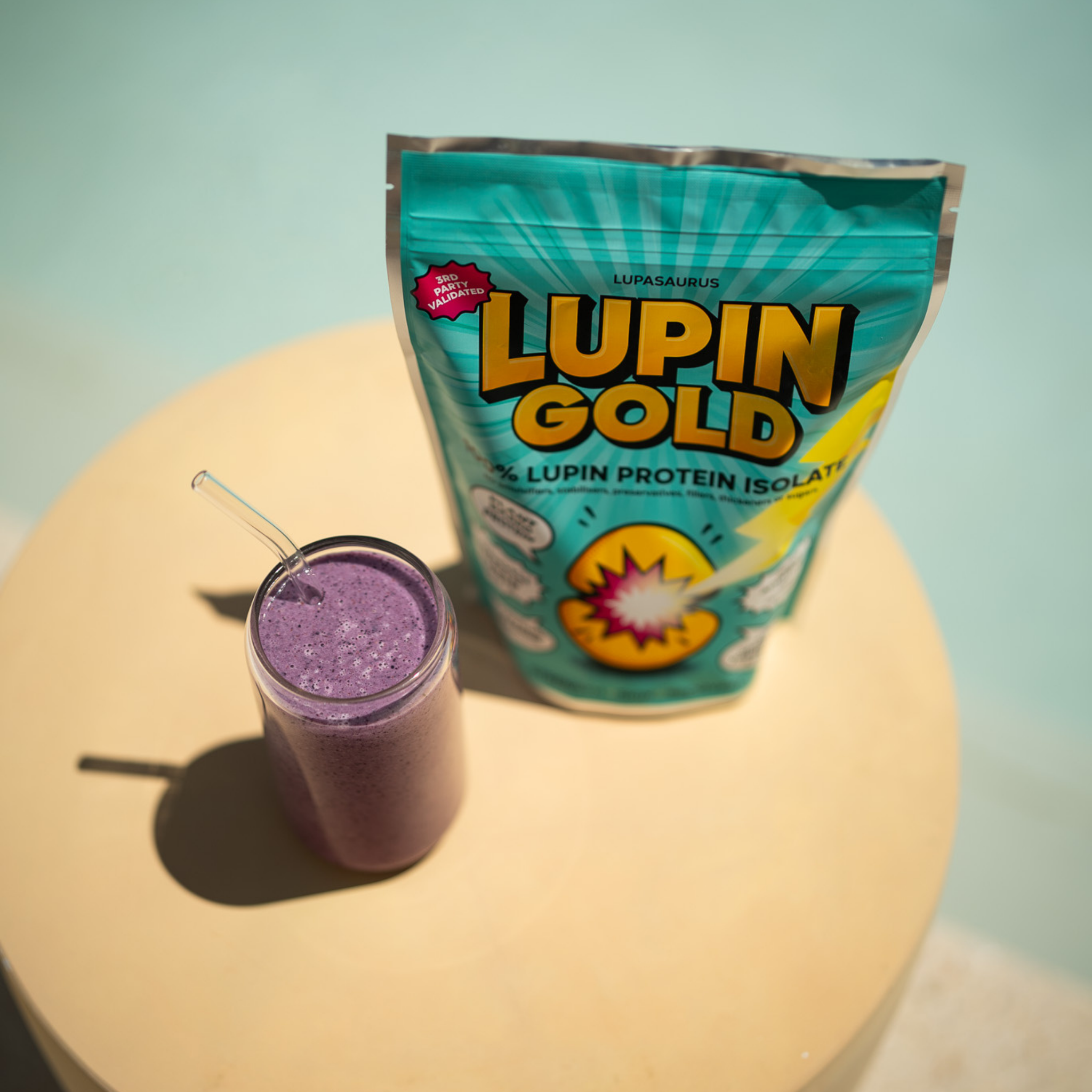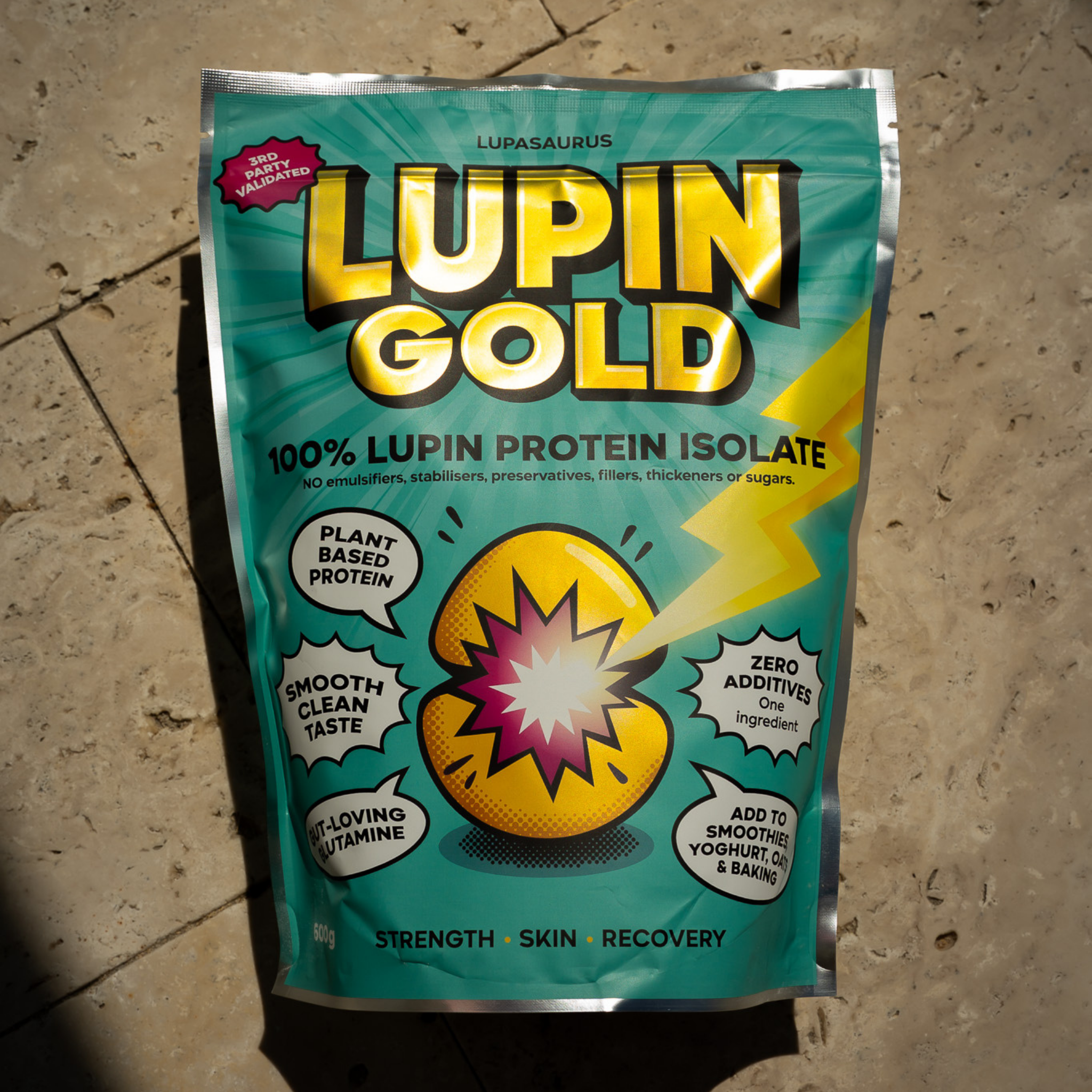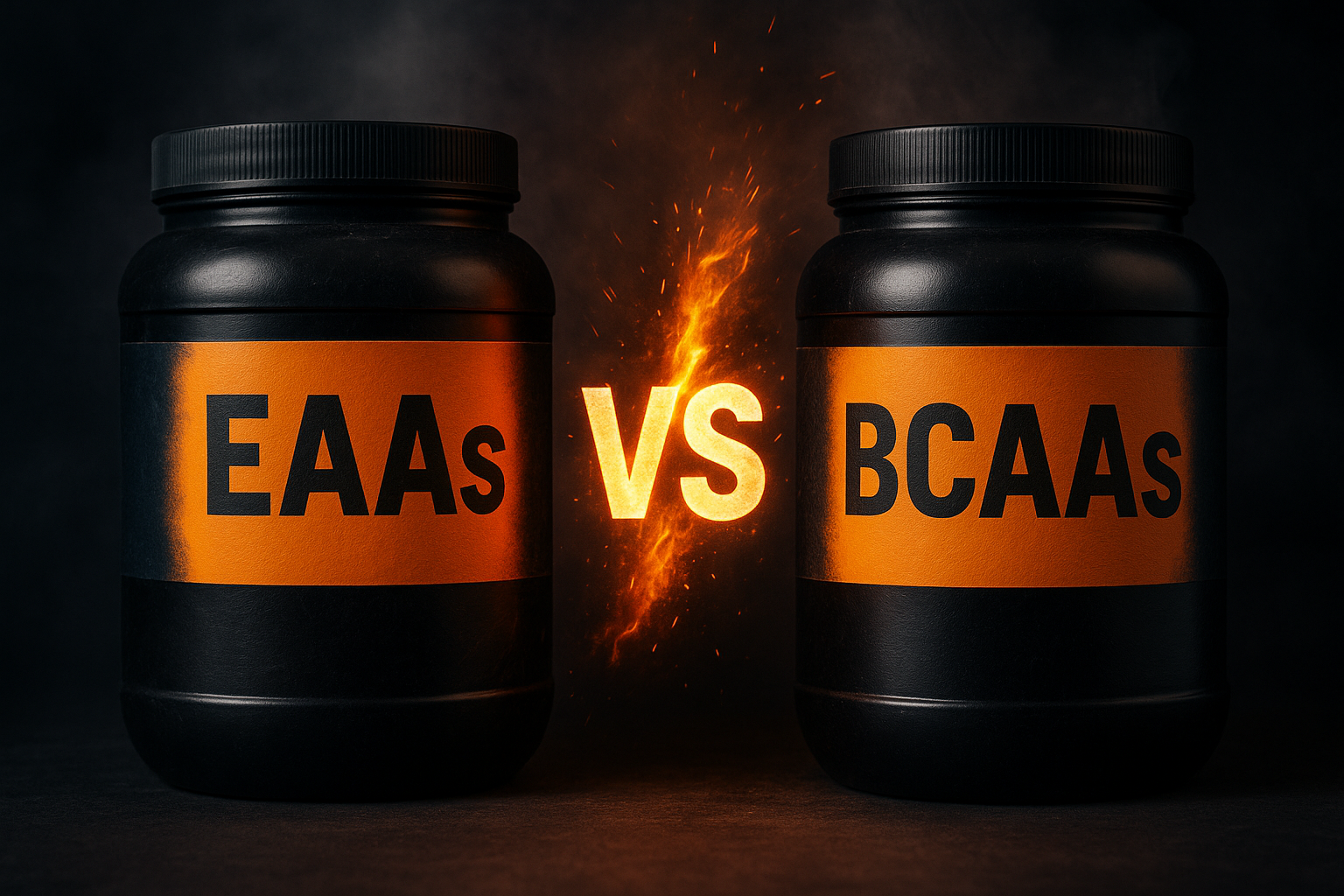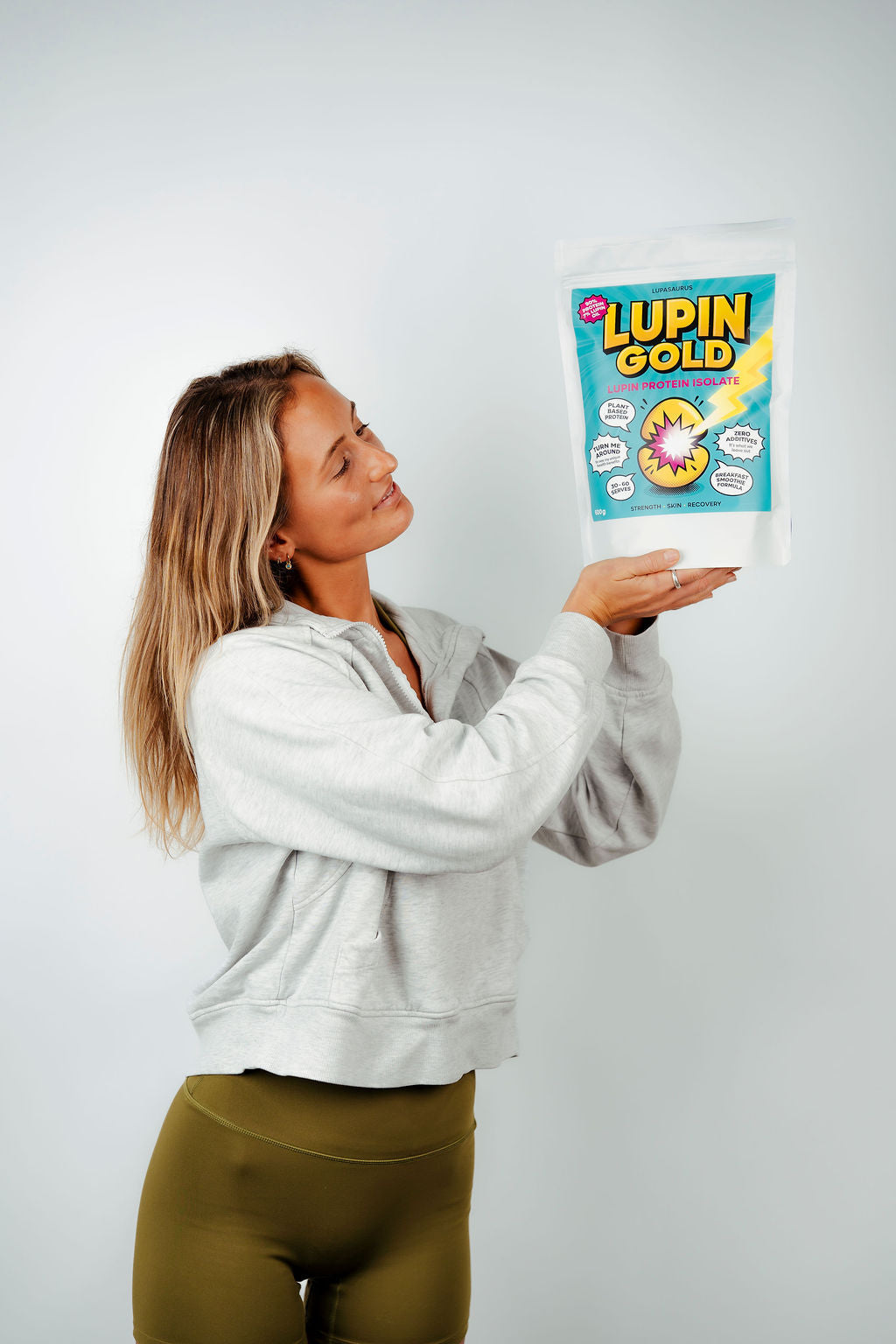“Leaky gut” gets tossed around a lot. In plain English it refers to increased intestinal permeability — when the gut lining’s tight junctions are less selective than they should be. That state is real in some conditions; the label “syndrome” is debated. Either way, supporting your gut barrier with diet and smart nutrients is a sensible goal.
Lupin Gold is a single-ingredient lupin protein isolate from WA sweet lupins. It’s naturally rich in key amino acids (notably glutamine and arginine), highly digestible, and easy to fold into real food. Below, we break down what “leaky gut” means, how amino acids and fibre-driven SCFAs support the barrier, and where Lupin Gold can fit — plus simple recipes.

Evidence at a Glance
| Key nutrient | What it supports | Why it matters |
|---|---|---|
| Glutamine | Tight junctions; enterocyte fuel | Helps maintain barrier integrity; often low under stress/illness. |
| Threonine & Serine | Mucin production | Builds the mucus layer — your first line of defence. |
| Arginine | Blood flow (NO); repair pathways | Supports microcirculation and cellular recovery. |
| Glycine & Proline | Anti-inflammatory / structural roles | Soothes the mucosa; provides collagen-type building blocks. |
| SCFAs (e.g., butyrate) | Tight junction signalling | Fibre-derived bacterial metabolites that strengthen the lining. |
Notes: “Leaky gut syndrome” isn’t an official diagnosis; increased permeability is a measurable state in some conditions. Nutrition can be one supportive lever among many.
What “Leaky Gut” Actually Means
In a healthy intestine, tight junction proteins act as gatekeepers, letting nutrients through while keeping unwanted particles out. In certain diseases (e.g., coeliac disease, IBD), permeability increases alongside inflammation. Outside of those, evidence is still evolving, so think “support the barrier” rather than “treat a diagnosis”.
Nutrition for the Gut Barrier
- Protein & amino acids: the lining turns over quickly and needs building blocks — especially glutamine for fuel and junction stability.
- Prebiotic fibre: diverse fibres → SCFAs (like butyrate) → signals that upregulate junction proteins.
- Probiotics/fermented foods: can modulate the microbiome and barrier; effects are strain- and person-specific.
- Anti-inflammatory nutrients: omega-3s, polyphenols, zinc, vitamin D complement the above.
Lupin Gold: Why It’s a Good Fit
- High in glutamine (as glutamic acid) & arginine: convenient way to fold these into meals without separate powders (and it tastes amazing).
- Highly digestible (~96%) & neutral: smooth in smoothies, oats, yoghurt, and bakes; no sweeteners or gums.
- Low-FODMAP friendly by design: as an isolate, it retains a small amount of natural lupin fibre but with all the grit and acidic compounds stripped away, making it gentler than lupin flour.
- Allergen note: lupin is a declared allergen in AU/EU. Peanut/legume-allergic individuals should seek medical advice before use.

Simple, Gut-Friendly Recipes
Blueberry Ginger Gut-Soothing Smoothie
- 1 cup almond milk (or milk of choice)
- ½ cup frozen blueberries
- ½ small banana (optional; reduce for strict low-FODMAP)
- 1 spoon Lupin Gold
- ½ inch fresh ginger, grated (optional)
- 1 tbsp chia seeds
Blend until smooth; thin with extra milk as needed.
Overnight Oats with Lupin Protein
- ½ cup rolled oats • 1 scoop Lupin Gold • 1 tbsp chia
- ⅔ cup milk of choice • (optional) ¼ cup yoghurt
- Cinnamon; berries & nuts to serve
Mix well, refrigerate overnight, adjust with a splash of milk in the morning.
Collagen vs Complete Protein — Quick Take
- Collagen peptides: glycine, proline-rich; not a complete protein; can be a targeted add-on.
- Complete proteins (e.g., lupin isolate): include all EAAs — the foundation for total protein synthesis, including gut and skin tissues.
- Practical plan: Use Lupin Gold daily; add collagen if you enjoy it and want a peptide top-up.
Who Should Be Cautious?
- Known lupin or peanut/legume allergy: speak with your clinician.
- Very sensitive IBS/SIBO: start low (½ serve) and build as tolerated (the feedback we receive from customers suffering with IBS is fantastic).
- Medical conditions / protein-restricted diets: discuss changes with your healthcare professional.
FAQs
Is “leaky gut” a real condition?
Increased intestinal permeability is real and measurable in some contexts. The term “leaky gut syndrome” as a stand-alone diagnosis remains debated. Focus on evidence-based supports: diet, fibre, and appropriate proteins.
Is Lupin Gold low-FODMAP?
As an isolate, it contains only a small amount of natural lupin fibre and is gentler than whole lupin flour. Individual tolerance varies — trial a small serve first if you’re sensitive (keep in mind, this protein powder is gut-friendly and healing).
Can I use Lupin Gold and collagen together?
Yes. Think Lupin Gold as your daily complete-protein foundation; add collagen if you like it as a targeted peptide boost.
Any allergen concerns?
Lupin is a declared allergen in AU/EU. Those with peanut or other legume allergies should seek medical advice and may need to avoid lupin.
The Bottom Line
“Healing” a leaky gut is really about supporting the gut environment so it can repair itself: calm inflammation, feed your microbes, and supply the right building blocks. A clean, digestible complete protein like Lupin Gold helps you do that consistently, in food you already enjoy.
Medical disclaimer: educational only; not personal medical advice. Please consult your healthcare professional for individual guidance.
Helpful internal links: Allergen information • Scientific stuff
Disclaimer: This article is for general information only and reflects our own research and understanding at the time of writing. We are not scientists, and information may evolve. It is not individual medical advice — please speak with your healthcare professional for personalised guidance.


